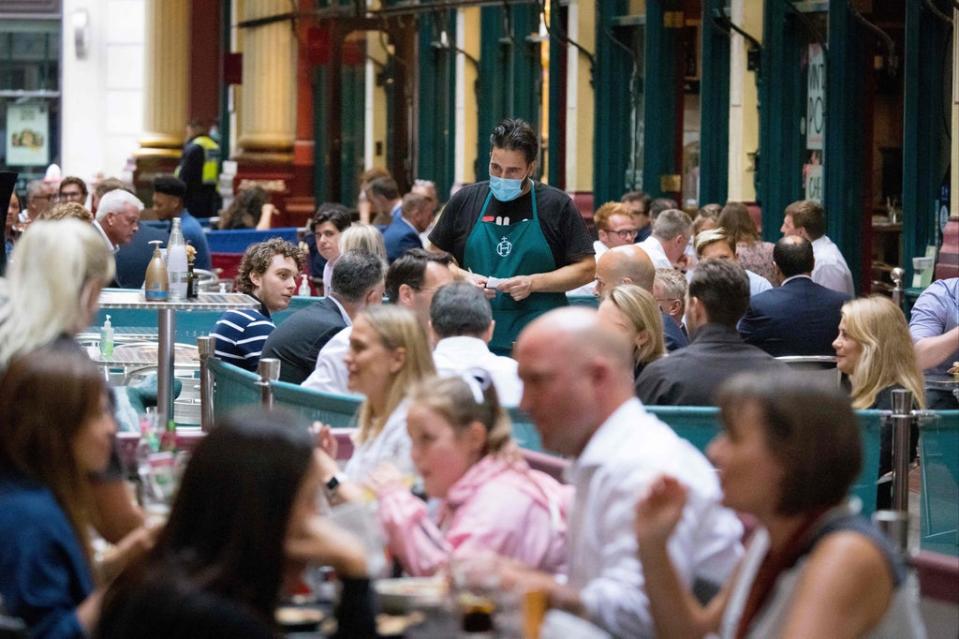Restaurant staff to keep 100 per cent of tips as business secretary expected to change law

The business secretary Kwasi Kwarteng is expected to announce a change in the law this week that will entitle staff to 100 per cent of their service charge.
At present, legislation prohibits restaurants from holding onto cash tips, but when a tip is given over card, it is at the restaurant’s discretion as to how and where that money is spent.
Kwarteng’s new bill looks to change that, meaning that 1.7 million hospitality workers will receive the service charge in full, whether a customer gives it in cash or card.
Speaking to the Standard, a government spokesperson said: “We are doing everything we can to back hospitality staff as the sector recovers.
“Workers should get the tips they deserve, and customers should have reassurance that their money is rewarding staff for their hard work and good service. Further announcements on this key issue will be made shortly.”
Currently, some restaurants don’t give individual servers 100 per cent of the service charge, preferring to divide it between the entire teams, including the kitchen staff, bartenders and maître d'. However, less scrupulous operators keep the charges for the restaurant or for themselves, leaving staff out of pocket.
Asma Khan, the restaurateur behind Covent Garden’s Darjeeling Express, told the Standard she supported the bill: “For management to take a cut from service charges is deceptive — if all the money does not go to the staff, it should also say ‘management charges’ on the bill.
“Hospitality does not have a good track record for self regulation — it’s unfortunate that it needed legislation to ensure the staff get all of their tips.”
Adam Handling, who has four restaurants across the country, said: “I think no owner or manager should have anything to do with tips given to staff. I think they should go entirely to staff and should be managed either by an outside body or a supervisor in charge of doing it, and I also think it should be a 50/50 split — I don’t think it should all go to front of house as it’s one team, one collective.
“I can categorically say from the day we opened our restaurant group I have never seen or handled a single tip. When it’s card tips, we actually allow [staff] to remove the money from the till so that they can use it there [and then].”
However, Handling opined a note of caution for the proposed system, noting that: “When you talk about tips and service charge, they are very different.
“Tips are what someone gives to an employee for doing something over and above their job, making someone really happy.
“Service charge is a different thing — that’s for the whole operation, such as the building. Think about the service charge for an apartment, that pays for a lot of things, it doesn’t just pay for the concierge sitting on the desk. So I think [in a restaurant], it pays for the service of the reception staff, of the people making the bookings, the reservations team, of everyone. It gets shared out to a wider field. Tips get shared between the front of house and the kitchen, but service charge gets shared though the whole of the group making the operation work.”
The Standard has reached out to Kwarteng for clarification over what the new law will control, and whether restaurants will be left to divide a split of the service charge or if it will all go to individual staff looking after a table. If the latter, there may be difficulties in understanding how tips are supposed to be divided when one or more waiter has served a table.
Hospitality does not have a good track record for self regulation — it’s unfortunate that it needed legislation to ensure the staff get all of their tips
Asma Khan
The news comes as the hospitality industry continues to struggle through a staffing crisis, partly as a result of the pandemic and partly a fall-out from Brexit. Hospitality vacancies have risen by 60 per cent in the past year, with, in many cases, wages offered at an historic high.
Jon Spiteri, who is a partner in new Farringdon opening the Sessions Arts Club, said that in his restaurant tips were handled by a seperate company, with Sessions taking “a tiny amount out for administration.”
He added: “It’s a good idea as the industry needs to change if it’s to survive and out most valued assets are our staff. Anything that benefits them without destroying the hospitality industry must be a good thing.”
Read More
Pret A Manger shop staff get pay rise, as hospitality sector scrambles for workers

 Yahoo News
Yahoo News 